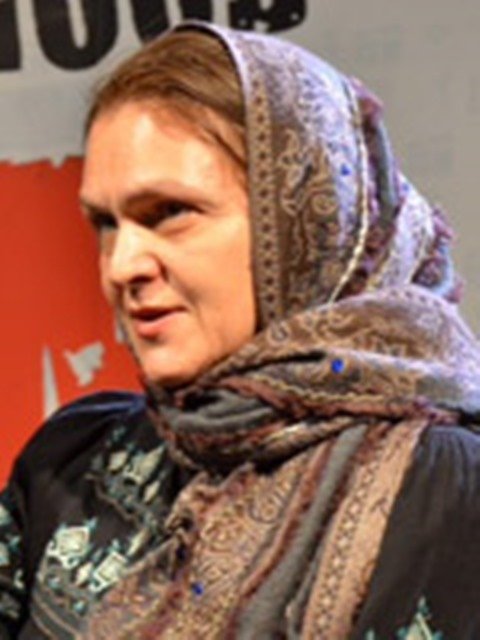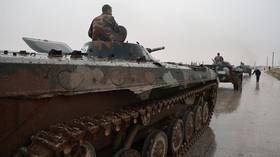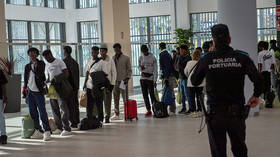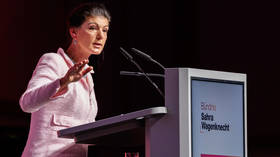‘Donbass’ International Brigade
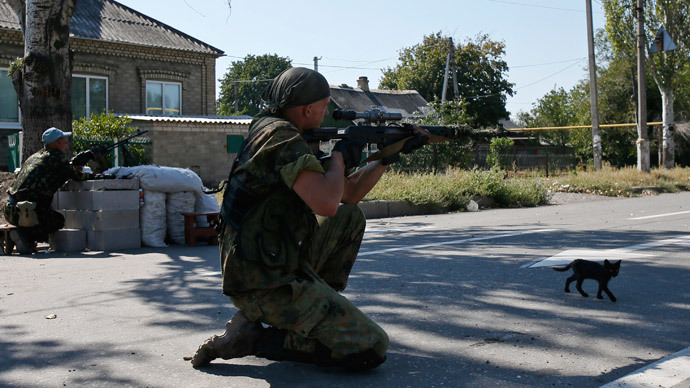
The strength and whereabouts of the International Brigade operating in east Ukraine is a secret. Yet it is possible to interview the unit’s ragtag troops. They have no single ideology or political affiliation.
But they do believe in accepting volunteers regardless of their background and religion.
The brigade’s ranks include Christians, Muslims and atheists; miners and novice monks; young and old; loners and family men. It even has a few young women.
Most of them have never even heard of the Spanish Civil War where the term “International Brigade” springs from. They have no idea of Communism or Socialism. Sticking to the old Soviet mindset, they still regard Nestor Makhno, the Donbass-born Civil War hero, a symbol of anarchy, while seeing Joseph Stalin as the epitome of order. They have no idea that it was Stalin who stopped aiding the International Brigades in the middle of the Spanish Civil War, effectively enabling General Franco’s Nationalists to win.
And if today’s International Brigade fighters are to win their war, they have yet to develop an ideology to underpin their unity. The only ideology they currently share is their brotherhood in arms.
Abkhazian
The International Brigade’s commander, 28 (call sign ‘Abkhaz’) is an ethnic Abkhazian coming from Sochi.
He was six when his father fought in Abkhazia.
"I am a war child," he says.
His son is also six.
“When he grows up he’ll ask me whether I was watching the war in the news. Thousands of Russian citizens came over to fight this war; this is why I am here as well,” he explains.
Abkhaz has been here in Donetsk since the early summer.
He had served in the Armed Forces as a conscript at the Russian military base in Abkhazia. He was an infantry rifleman.
“We Abkhazians have been trained since childhood. We are hunters, so we are familiar with arms,” he says, “An armed people ensure their own security.”
Not all the rebels share his views however. Paradoxically, many are concerned that the Donbass residents rush to get their hands on weapons abandoned by Ukrainians – at times even ahead of the militias themselves.
His father and uncle were observers at the Donetsk elections.
Abkhaz joined the unit not because he wanted to start a new life, or because he was a failure back home. He had a degree in economics; and he had a job and did social activities in Sochi. He was growing vegetables in a greenhouse that his brothers and he had built. As for his social activities, he was planting trees, and helping establish relations between rap fans, racers, and other subculture groups with the city administration.
So Abkhaz joined the war not only as a skillful fighter but as someone with experience of settling ethnic and other kinds of conflicts. His background of communicating with the young in society in Sochi became handy here.

His father is a Muslim, and his mother is a Christian.
“What I’ve seen here is something I’ve dreamed of. This isn’t a war between Ukraine and Donbass; this is global showdown. They think we are a professional army or some kind of Special Forces – this is just ludicrous. I am attached to my homeland; I was enjoying myself working my grandmother’s garden. But I want to justify the confidence of my fighters who have chosen me as their commander. Most of them come from occupied areas; some are hereditary miners eager to restore their mines. I want to help them win their freedom – them and their cities, towns, and mines.”
This explanation makes the biggest sense out of everything I’ve heard so far. Others keep ranting about fighting the Kiev Fascists, junta, and oligarchs.
They believe they are fighting for the borders of the Donetsk Oblast:
“We’ll see what happens when we reach the borders of the Donetsk Republic. Some of my fighters who are from Kharkov and Zaporozhe want to move the borderline even further. Generally, the River Dnieper is the borderline. But I also wouldn’t rule out that the Ukrainian Army would turn around and go against Kiev.”
Chechen
“Emergency” is the call sign of a 22-year old Chechen. While being an only son, he still secured their blessing to go to war. His mother is a high school principal and an English teacher. His father had fought in the Georgian-Abkhazian War.
Emergency speaks Arabic having attended a madrasah. He was also trained as a lawyer, and did military service for a year. He has come to Donbass together with his uncle.
Emergency is on reconnaissance, and he cannot talk about his experience soldiering. He has only been back with his unit for two weeks, having recovered from shrapnel wound that had nearly ripped his carotid artery.
Emergency is a practicing Muslim.
“I get up at 5:30am to pray, ahead of everyone else,” he says. “I pray five times a day. There are also guys from Dagestan here. We Muslims get food cooked separately for us. There is halal meat in a local store, so they buy it for us. Drinking is prohibited in our brigade.”
Emergency has met no other Chechens fighting in Donbass save for himself and his uncle, though he has sure heard of the media hype alleging their presence in strength.
“Well, let them tell those tales if they want to,” he smirks.

Bashkir
The local gunner, 31, (call sign “Black”) was born here in Donetsk. His father is a Bashkir, and his mother, a Ukrainian. Black speaks Ukrainian.
He is not willing to marry any time soon. “I might get married after the war is over. A family is a distraction,” he says.
Upon graduating from school, he wanted to study at a military academy but they would only enroll him if he paid a bribe. He is a vocal opponent of corruption, and so he had to serve in the army. Following his two-year duty, he signed a contract and served as a paratrooper. He joined the militia in June.
“I am gunner,” he tells me. “I’ve got many fellow troops fighting on the other side. One calls me up, from time to time, after getting drunk. If they are all like him, we are going to win this war,” he adds.
“I didn’t want a war. I worked as a guard, and was waiting for a miracle, a repeat of the Crimea story, that Donbass would just join Russia. But hostilities flared up in Slavyansk, and the chances for a miracle were dying away. I simply couldn’t go to work. I joined the militia thanks to a friend of mine when it was all still quiet,” says Black.
He took part in the battle for the local airport and the fighting near the town of Shakhtersk.
“We are part of an assault unit. We don’t man any roadblocks, we are idle during this ceasefire,” he explains.
“I am platoon commander and must act as a role model for the boys,” he tells me. Black recalls four of his friends who died. They found the bodies of three of them but the remains of the fourth were never located.
His family is in the dark about his mission. “I didn’t tell anyone, and so my mom, sister and two brothers still think I work for the private security company.”
“I chose my way, and will stick to it,” says the platoon commander. During his time with the militia he was paid only for the previous month.
“I wear what I managed to buy myself. Many of the boys wear the uniform and the gear they capture in battle. The Ukrainians from the Cherkassy battalion left all their gear during the hasty retreat. We’ve made good use of it. It’s all high quality. Both armies use Kalashnikov rifles. We didn’t see any foreign weapons.”
“We don’t have a situation when someone has three rifles and another one doesn’t have any. We make sure that everyone has what they need,” explains the platoon commander.
“The striped vest and blue berets were introduced as the uniform for Soviet airborne troops by Margelov (general of the Soviet army, WWII veteran, holder of the Hero of Soviet Union – RT), and came from the Ukrainian city of Dnepropetrovsk. He is a role model for all of us,” he says.
“I do worry about the future of my land. I didn’t dig deep into the ideology. Anyway, monarch or oligarchy is not for us. I like Joseph Stalin, he was strong and kept everything under control,” he represents his politics.
Russian
“Student”, 25, is from Novosibirsk. He married an 18-year-old girl at 15, with a bit of cheating of course, and now has an 8-year-old daughter.
“I’ve had enough during these nine years of marriage. I got divorced. We used to have rows before,” he told me.
Back home, he dodged the military draft and worked as a foreman, renovating apartments.
His father is serving his time in jail, and Student himself uses a lot of prison jargon but no foul language. It’s not allowed in the unit.
His mother works as a doctor in a maternity clinic. He’s got a sister, too.
“They know where I am, and they strongly support me,” he tells me.
“I was tired to watching the news from Ukraine. I couldn’t sit idle any longer, and so in September I came here, and these guys, they are my brothers now,” he explains.

He got into the unit by chance – on his way to Ukraine he made some new friends and they helped him get here.
“The Ukraine’s new government thinks it can do anything it wants. But it’s high time we kicked them out. Donbass is a sovereign state. I came here as a guest, and I am going to help them win so it’s peace and quiet again. I’ll then come back for my vacation once it’s all over,” he muses.
“They gave me a gun, and so I learned to use it,” that’s how he describes his military experience.
Student likes it here in Donbass, although he doesn’t plan to settle down here.
“There’s law and order here, and even the traffic police are on patrol. Everything is under control.”
He, too, views Stalin as a role model. One of his concerns is too many weapons in the hands of the local people. “They should lay down the arms after it’s all over. It’s bad when you have so many guns in the community.”
Ukrainian
23-year-old ‘Cabin’ is from Donetsk. He joined the rebels on May 26, and on the very first day found himself in the airport shooting. They armed all the fighters who were there, and a fight began, recalls Cabin. He served one year in the Ukrainian Armed Forces as a conscript with an airborne unit, and was planning to reenlist.
“But then everything changed, and I left. I didn’t want to stay on that side, with their nationalist views and nationalist symbols, even though at that time I had no idea that there would be ‘this side’,” he said.
“I was participating in all the rallies, and then I joined the Oplot Battalion (commanded by the newly elected Prime Minister Zakharchenko – RT)”
Cabin’s uniform looks spectacular:
“It was gathered piece by piece. I got some items as presents, others, as trophies.”
He has a university degree in electrical engineering. His family consists of his mother and grandfather. The grandfather comes from Western Ukraine; however his family was [Russian] Orthodox rather than Roman Catholic.
“We have many Russian Orthodox believers with us here. Our friend, a monk, was killed here in August. He had fought in Afghanistan during Soviet times. Then he took the vows and went on a self-discovery journey. He got a deadly wound in his abdomen,” explained Cabin.
They also have a deacon nicknamed “Small Guy”: “He secretly brings priests here across the border to do church services for our fighters, and then takes them back,” said the fighter.

Fiancée
Cabin has a fiancée in the unit. Her call sigh is “Little Cabin.”
“I met him at one of the rallies. We realized that we shared common views and positions. That’s how we got together,” says the young lady.
She comes from Donbass. She was working as a general practitioner, and was doing her medical residency. She was looking at great career prospects.
“I gave up my job without thinking twice. The unit needs medical workers badly. My mother and brother both supported my decision, even though my brother isn’t fighting. There are those who have to fight, and others, who would be killed immediately,” said the young lady.
“I am an independent person. I’ve left my family long ago, so they had no choice but to support me. They knew that I would do what I thought was right anyway,” she explained.
The fighters protect her, and don’t take her out in the fields with them.
“We have a physician and military nurses with combat experience, so they are the ones participating in fights. I asked to go out as well but was strictly forbidden to,” says Little Cabin.
“We’ll get married after the war. We have four couples in our unit who got married already. One of them had a baby, and two other girls are pregnant. But we want to wait for the time when we’ve won our freedom.”
She explained that at first, an Orthodox Brigade was established.
“But it didn’t really work well. We transferred to the Interbrigade once we heard about it.”
Novice Monk
“Deacon” is 36. He had no family and grew up in an orphanage. He got an economist manager degree at a technical college, and worked at the Donetsk central market.
“I was tired of worldly living. I didn’t want to be surrounded by people driven by money,” recalls Deacon.
His nickname was coined for a reason. He had been a novice at the Svetlodarsk Monastery in Ukraine for four years.
“My Father Superior blessed me for the fight. I know the brothers are praying for me. There were 12 of us novices who came here. I’ve been fighting for five months now. I was wounded as well, got a moderately severe wound,” says the fighter.
“I do the shooting, this is my job,” he explains.
“They shell our cathedrals. They destroyed a convent near the airport. They shot a priest dead in Konstantinovka last May. So the Orthodox believers are here for a reason. When I was recovering from my wound I met a monk who had also been wounded here,” says Deacon.
The statements, views and opinions expressed in this column are solely those of the author and do not necessarily represent those of RT.
The statements, views and opinions expressed in this column are solely those of the author and do not necessarily represent those of RT.
